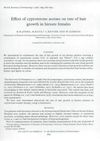Hirsutism: Evaluation and Treatment
February 1985
in “
Journal of the American Academy of Dermatology
”

TLDR Excessive hair growth can be assessed by history, exam, and blood tests, and treated with medication like dexamethasone, birth control pills, and spironolactone.
The document from 1985 discusses hirsutism, which is characterized by excessive hair growth and can indicate a serious systemic disease. It suggests that hirsutism can be evaluated through a patient's history, physical examination, and blood tests. The document states that most patients with functional hirsutism show hormonal imbalances, such as increased testosterone production and clearance rates, reduced sex hormone-binding globulin levels, and heightened serum-free testosterone and hair follicle sensitivity. Effective treatments for functional hirsutism, after excluding neoplastic causes, include low-dose dexamethasone, oral contraceptives, and spironolactone.





